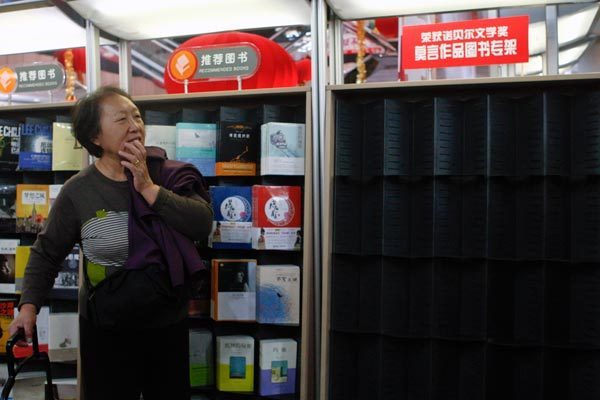Nobel winner's books flying off the shelves
Updated: 2012-10-13 01:23
By Xu Lin (China Daily)
|
||||||||
Cao Hongmin rushed to a bookstore on Friday morning before it opened. But to her disappointment, the 46-year-old fan was told that classic works by the new Nobel laureate in literature Mo Yan had sold out the day before.

A reader gazes at a shelf emptied of Mo Yan’s books at Xidan Books Building in Beijing on Friday. Books by Mo Yan, the new Nobel laureate in literature, sold out one day after he was announced the winner. [Photo/Zhang Hao / China News Service] |
"Mo has won the Nobel Prize, I know his books are excellent," said the Zhejiang native, who became interested in Mo after the announcement of his award. The woman said she did not expect his books would sell out so fast.
"My husband asked me to buy some of his books the instant we knew he won. But we were still late."
The 57-year-old Mo, who was announced the winner on Thursday evening, rapidly became a buzzword on the Internet and his works are selling like hotcakes.
His fans stormed bookstores across the country and snapped up his most famous works such as Frog and Big Breasts and Wide Hips.
Kou Weidong, a reader from Beijing, found that Wangfujing Bookstore, one of the largest in the capital, has set up an exclusive bookshelf for Mo but his books had already sold out on Thursday night. Many are still coming to inquire about his books, which had lukewarm sales before the announcement.
"As a Chinese, I'm so proud of him," Kou said. He was also told that he had to wait at least a week to get Mo's books from the store as presses are busy reprinting his works.
Moreover, it's not easy to get a hard copy of Mo's works online either, as many of his classic works have also sold out in leading Chinese e-commerce websites.
According to 360buy.com, sales of Mo's books jumped sharply after his win, and demand is exceeding supply although they had stocked up.
For example, orders of Big Breasts and Wide Hips on Thursday night were twice those made in the entire month of September, and new orders are still flooding in. The website is busy preparing stock and plans to sell Mo's e-books online.
According to Ye Xiaozhou, a public relations officer from e-commerce provider China Dangdang, more than 10,000 of Mo's books were sold within 24 hours and they've ordered the last stocks from publishers.
"It's not surprising that one's books sell more when one wins the Nobel Prize. But this time people are more passionate because the winner is a Chinese," Ye said.
The craze for Mo has led to a craze in the publishing field as well.
Beijing Genuine and Profound Culture Development Co will publish a set of Mo's collected works, which consists of 16 novels and four previously unpublished books including plays and prose.
The company signed a contract with the writer in May, with full publishing rights as well as film and play adaptation rights of all his works.
"We achieved an agreement last year. I never expected Mo to win the Nobel Prize at that time," said Chen Liming, president of the company. "Other presses are publishing Mo's works due to their old contracts but we have the latest contract, with a term of at least three years."
In the meantime, Shanghai Literature and Art Publishing Group just published a new edition of Mo's collected works in 16 volumes.
"The collection should have come out last June or July, but was delayed because of problems with the graphic design. Now it has become a happy coincidence," said the group's deputy director Cao Yuanyong.
"I believe in the Chinese readers today. They have the curiosity, passion and their own judgment for the latest Nobel laureate," Cao said.
Writers Publishing House is also competing.
"It's our honor to publish Mo's collected works. Our press has published most of his books since 1986, when his first book came out," said its president Ge Xiaozheng.
To be sure, the best selling work of Mo's is arguably Red Sorghum. The book has sold 5 to 6 million copies through the years, Shanghai Literature and Art Publishing Group's Cao estimated. "If you count pirated copies, the number will surge to 10 million."
Another novel of great popularity is Frog, full of action and drama on the implementation of family planning in rural China. It has sold more than 200,000 copies since it was published about two years ago, Cao said. "We have faith in Mo as our writer, and he has faith in us as his publisher."
Eric Abrahamsen, a veteran critic and founder of the English-language website on Chinese literature Paper Republic, said: "The prize will definitely bring a boost to sales of his books, but I think we shouldn't overestimate what this will mean for Chinese literature as a whole.
"Chinese people will be very happy, but there are plenty of past examples of a Nobel Prize doing very little for the writer who wins, or for his or her national literature," he added.
Zhang Kun in Shanghai and Liu Wei in Beijing contributed to this story.
xulin@chinadaily.com.cn
Related readings:
Mo Yan sparks discussion about Chinese literature
Industries cash in on Mo Yan's Nobel success
Mo Yan's winning of Nobel Prize inspires young authors
Mo Yan says Nobel prize means more eyes on Chinese literature
Nobel laureate in literature Mo Yan
How did Mo Yan win Nobel Prize?











